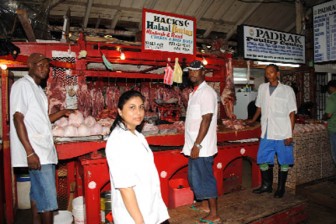The centre aisle of Bourda Market is usually the liveliest. It is where the butchers dwell. The rhythmic sounds of their choppers resonate off their chopping boards and through the passageway, having only just cut their way through meat and bone.
At intervals, the owners of the stalls or their helpers would direct their attention to the shoppers strolling through the aisle, urging them to examine the meat on offer.
If you enter the middle aisle from Orange Walk you will, most likely, encounter Andrea Hack first. She is by no means the only woman in the business of selling meat, though her white overcoat tends to catch the eye. She too beckons to customers to come closer, to examine what Hack’s Halaal Butchery has to offer. Once you show an interest she issues instructions to her team of two or three butchers.

Hack says the vigorous lobbying by the butchers is part of the market culture. There are other stricter rules, she says, like the requirement that the stand be built higher than regular stands.
Andrea is a good-humoured and seemingly mild-mannered woman, who appears out of place in what appears to be a rough and tumble environment. She laughs when you say this to her. It took time to develop the “aggressive and forceful” style that prevails in the environment. “That’s what it takes to do the business,” she says.
Hack recalls being “a quiet and shy girl” but that, she admits, was a long time ago. Once she decided to immerse herself in the business she had no choice but to put her shyness behind her.
Since she is much too slight of frame for all of the rigours of the trade Hack’s establishment is staffed by three able-bodied men who fetch the meat her stall. She can cut and carve meat, though most her time appears to be spent wooing customers and issuing instructions to the hired help.
As a schoolgirl, Hack spent much of her spare time assisting her mother, who sold cosmetics in Bourda Market. It was during that time that she met her husband, himself a butcher who plied his trade from a stall not far from where her mother traded.
It was not immediately apparent that Hack would become involved in the business of selling meat. Upon leaving Central High School – having secured five subjects at the Caribbean Secondary Education Certificate exams, Hack joined the Georgetown City Council’s Rates and Taxes Department where she served for two years. Marriage followed, after which she joined her husband in what was now a family business. That was 22 years ago. Eight years ago she opened and now runs her own establishment, Hack’s Halaal Butchery.
Business, she says is steady though it has its troughs. Over the past three months the cost for beef has risen several times and at the current price of $480 per pound may just be beyond the cost of the average consumer. Still, Hack says that she can rely on customers who favour their Sunday meal of soup. There is really no point in soup without beef.
If the demand for beef has been maintained over the years Hack says people have become more “picky”. The more affluent are acquiring larger quantities of the better cuts of meat and the health conscious are demanding that butchers go “easy on the fat.”
There are wholesale customers too, like dredge owners, who take meat back to the mining sites.
Hack says the demands of her customers compel her to make more determined efforts to acquire “quality” meat. Most of her cows are purchased from farmers in Berbice or Essequibo. The cows are moved to the Georgetown Municipal Abattoir where they are examined and slaughtered before being transported to market. Beef is delivered to her stall on Mondays, Wednesdays and Fridays.
Hack’s working day starts at around 07:00 hrs and she works seven days a week up until 17:00 hrs.
She says that there is never a dull moment in her profession. Being a butcher in a market, “there is always something happening that will catch your attention.” Much of her time, however, is spent ensuring that she keeps her long-standing customers while luring new ones.
She believes, she says, in “flexing with her customers. It brings them back. At the end of the trading day she and her helpers must pack away the meat in cold storage and wash the stall in preparation for the following day’s trading.
Hack is the mother of one daughter, who is an Economics graduate of the University of Guyana. She is unsure as to whether her child will follow her into the family business.





